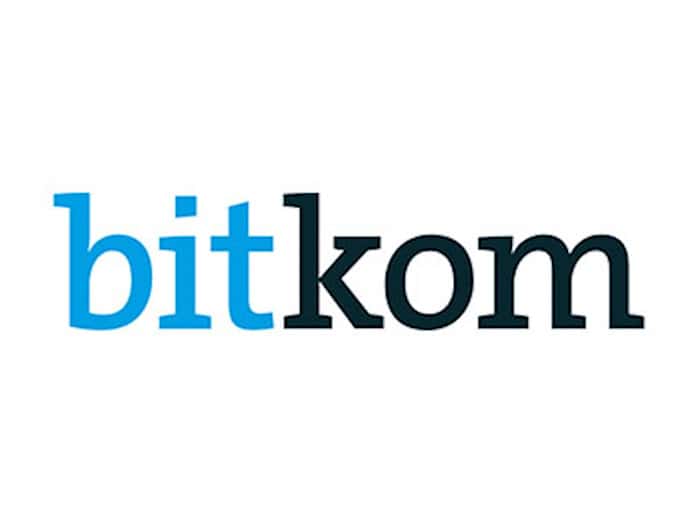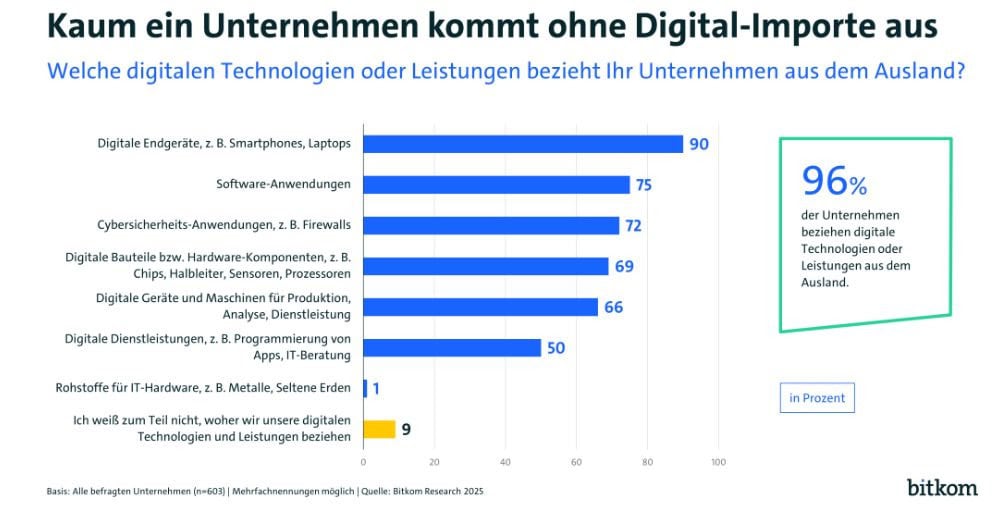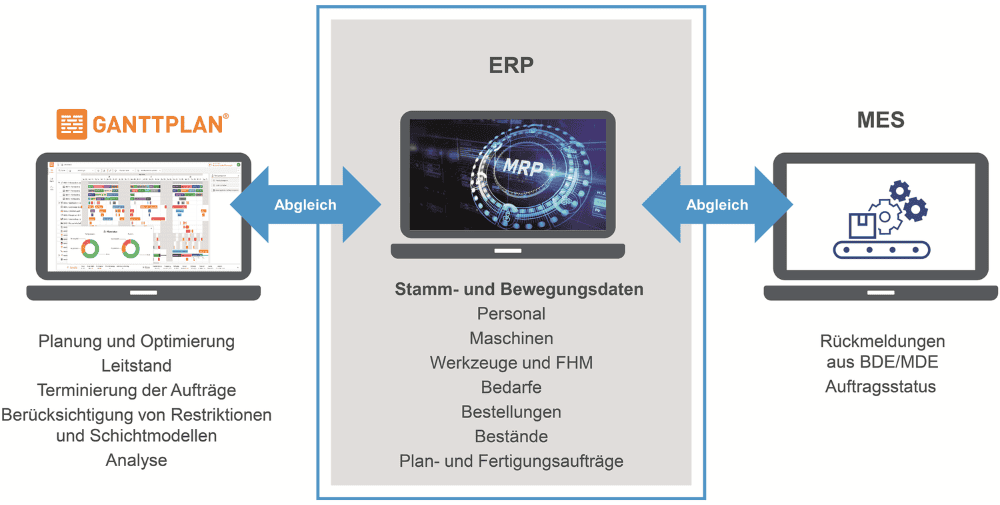
Ahead of the Trump administration taking office in Washington, the German economy is taking a similarly critical view of the USA as it is of China: 79% see themselves as dependent on the import of digital technologies and services from there, 35% “somewhat dependent” and 44% “strongly dependent”. Two thirds (68%) are concerned about China’s political dominance. Bitkom President Dr. Ralf Wintergerst: “Donald Trump will once again become President of the United States on Monday. This is a challenge for Germany and Europe. Although the USA will remain one of our most important partners, we must now position ourselves to be stronger, more resilient and more opportunity-oriented and become more technologically and economically independent. The new German government must put the economy back at the center of politics and make digital sovereignty a top priority.”
Without digital imports, every second company would not be able to survive a year
In total, hardly any company in Germany can manage without importing digital technologies and services (96%). At the top of the shopping list are end devices such as smartphones or laptops, which 90 percent of companies import. Three quarters (75%) source software applications and 72% cyber security applications such as firewalls from abroad. Digital components or hardware components such as chips, semiconductors or sensors are imported by 69%, and 66% of digital devices and machines for production, for example. Half of German companies (50%) source digital services such as app programming or IT consulting from outside Germany. In around one in ten companies (9%), however, those responsible do not always know whether and which technologies their company sources from abroad. Overall, 90 percent of companies that source digital technologies or services from abroad consider themselves dependent on them.
Among the companies that import digital technologies or services from abroad, the vast majority would only be able to survive for a short time if imports were to be stopped. 17 percent would only be able to survive for up to six months, 36 percent for seven to twelve months. Just over a third (39%) could survive for 13 to 24 months. Only 3% of companies could survive longer than two years without digital imports. “A country is digitally sovereign if it has its own substantial capabilities in key digital technologies and can decide for itself which countries it sources digital technologies from. The German economy needs strong, trustworthy partners for the digital transformation. At the same time, we need to become more digitally independent so that we are not open to blackmail,” emphasizes Ralf Wintergerst. The dependency on key technologies is currently particularly high. For example, 83% see Germany as heavily or somewhat dependent on semiconductor imports, 69% on components for the Internet of Things and 67% on artificial intelligence.
EU, USA and China are the most important countries of origin
The most important countries and regions of origin for digital imports are the EU, the United States and China. 87% of companies source digital technologies or services from the EU and the USA respectively. In each case, 59% even import digital technologies or services from there frequently, and 28% in individual cases. China follows in third place, with 78% of companies importing digital technologies or services from there (frequently: 58%, in individual cases: 20%). Taiwan and Japan follow a long way behind with 41% and 36% respectively (Taiwan 17% frequently, 24% in individual cases; Japan 7% frequently, 29% in individual cases). The United Kingdom (UK) is close behind with 34% (frequently: 7%, in individual cases: 27%). India is gaining in importance, with 20% of companies now sourcing digital technologies or services from there (frequently: 5%, in individual cases: 15%). South Korea (frequently: 3 percent, in individual cases: 9 percent) and the Latin America region (frequently: 3 percent, in individual cases: 11 percent) play a role as regions of origin for German companies.
Imports of digital goods and services also come from crisis and war regions: More than one in ten companies (frequently: 1 percent, in individual cases: 12 percent) import from Ukraine, and almost as many (frequently: 2 percent, in individual cases: 9 percent) source digital technologies and services from Israel. However, not a single company surveyed named Russia as a trading partner. “Russia no longer plays a role in the digital economy, trust in Russia has been permanently destroyed,” says Bitkom President Wintergerst.
Digital exports go primarily to EU countries
A quarter of German companies (25%) export digital technologies or services abroad – predominantly to EU countries. The majority of them go to EU countries (92%), but also to the USA (60%), Japan (55%), India (48%), the UK (48%), Taiwan (42%) and China (41%). Almost 4 in 10 companies (38%) export digital goods and services to Israel and 9% to Ukraine. There are virtually no exports to Russia. Which applications are at the top of the export list? 19% sell software, and almost as many (16%) sell digital services such as app programming or IT consulting. The figures are slightly lower for digital devices and machines (12%), digital parts and hardware components (11%), cyber security applications (8%) and end devices (6%). 71% of German companies do not sell any digital technologies or services abroad.
Diversification, larger warehouses, risk management – what companies are doing
The high dependency on digital imports has already prompted the majority of companies to take countermeasures. 59 percent have diversified their suppliers for this reason. Another 59 percent have significantly reduced business relationships in certain countries due to political developments. 42 percent have increased their stocks. Almost one in three companies (27%) have implemented a special risk management system. Only 13 percent state that they have not taken any measures at all. “It is an encouraging sign that the German economy is reacting sensitively and with concrete measures to the dependencies on digital imports,” emphasizes Bitkom President Wintergerst. “Most companies have recognized the signs of the times. It is important that politicians support these efforts effectively, in particular by creating a framework that promotes innovation and investment.”
International partnerships are associated with considerable risks for most companies. Half (50 percent) state that they have virtually no means of defense if they are put under pressure by foreign partners or governments. 62% are forced to take risks with regard to the reliability of policies at their partners’ headquarters. For 59 percent, there is simply no alternative to existing dependencies on business partners abroad. At the same time, almost all (94 percent) state that trust in the politics of the partner country plays an important role in the selection of global business partners.
High trust in the EU and Japan, low trust in China
Which countries does the German economy trust – and which not? The leader in the trust ranking is the EU. 97 percent of companies have very high or fairly high trust in the other member states. 2 percent have “rather low” trust, and none of the companies state that they have no trust in the EU countries at all. Japan follows in second place, with 73% of companies having a high or very high level of trust. At 60 percent and thus well behind Japan, the UK is in third place. One in two companies (51 percent) currently has some or a great deal of confidence in the USA, although 25 percent state that they have very little or no confidence in the United States. There is even more skepticism towards China: one in four German companies (26%) has very or somewhat high confidence, while the same number (26%) has somewhat low confidence. Almost half (44%) of companies have very little or no confidence in China. German companies’ confidence in Russia as a business location has practically reached zero. 97% of companies state that they have “no trust at all” in Russia, while a further 3% have only a rather low or very low level of trust. Ukraine is trusted by 37 percent, Israel by 40 percent. Wintergerst: “Companies in Germany will probably focus even more on the EU member states, but also on Japan and the UK.”
9 out of 10 companies are calling for an increase in competitiveness
The overall assessment of Germany’s digital sovereignty is poor. Currently, 91 percent of companies believe that Germany is heavily dependent (36 percent) or somewhat dependent (55 percent) on digital technologies and services from abroad. Only a minority of 7% believe that this dependency will have decreased in five years’ time. Just under a third (29%) expect the status quo to continue, while 6 out of 10 companies (60%) anticipate an increase in dependency.
German companies are calling on the new German government to make significantly greater efforts than before to meet the growing challenges: The competitiveness of the German economy must be massively increased, say 89 percent. 84% believe that the new German government should put strengthening digital sovereignty at the top of its agenda. Wintergerst: “Strengthening our digital sovereignty will determine our future competitiveness and resilience and therefore our prosperity and security. Our digital sovereignty is crucial to whether we are perceived as a strong player on an international level and are capable of acting geopolitically.” Three things are fundamental: 1. finding and retaining the right strategic technology partners. 2. being able to provide adequate answers to other countries’ attempts at technological blackmail. 3. to take all people and companies with us on the path to a digitally sovereign Germany. Above all, it is important that Germany develops its capabilities in key digital technologies in a targeted manner and achieves global technology leadership in a number of critical areas such as microelectronics, IT and cyber security, AI, industrial metaverse and quantum computing. “It’s not about technological self-sufficiency, but about the ability to make self-determined decisions in the digital world,” emphasizes Wintergerst.
– – – – – –
Further links
👉 www.bitkom.org
Graphic: Bitkom




